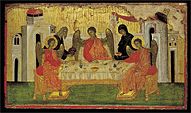Emerging church and orthodoxy...
 Scot McKnight has recently written a number of excellent posts in which he looks at the primary impulses within the emerging church movement and its understanding of and relationship with orthodoxy.
Scot McKnight has recently written a number of excellent posts in which he looks at the primary impulses within the emerging church movement and its understanding of and relationship with orthodoxy.Emerging and orthodoxy 1
Emerging and orthodoxy 2
Emerging and orthodoxy 3
Emerging and orthodoxy 4
I identify with many aspects of the emergent church movement. I think the missional impulse that seeks to authentically incarnate and witness to the gospel in culture is one of the main currents with which I resonate. I appreciate the voices within the movement that model an irenic spirit of conversation within the church and with culture (as opposed to the Fundamentalist tact). This space for conversation...paying attention to seismic shifts in culture...engaging culture with the gospel in non-defensive/reactionary/militant ways...all of these are healthy impulses.
This question that Scot McKnight addresses is one that I have been asking on my journey. It is a question of ecclesiology. What is the center of the Christian church? What is the prism through which we worship God, read Scripture, and interact with our culture? What is the relationship of the emerging church with the Creeds of classical Chrisitianity? The commentary and analysis by McKnight are helpful in connecting a few dots.


5 Comments:
At 10:11 PM , Anonymous said...
Anonymous said...
I realize you have less time now to answer questions, but I was struck by many things McKnight wrote (as well as his class members! What lively discussions!!!). Of course it sparked a flood of thoughts/questions in my mind about the function/value of creeds.
I really appreciated the link one student added to John Leith's "Creeds of the Church" and his excerpt about their role in the Church. He brings out the point that creeds are products of human achievement and that every human achievement "must be continually reformed by the Christian community's apprehension of the Word of God in Jesus Christ."
But I really appreciated two things McKnight said in one response to his students - if I may paraphrase: One is that many Christians have become ambivalent to the use of creeds because they have used them all their lives and have not seen a significant difference in their lives. SOOO ... going back to the already used analogy ... they throw the baby out with the bathwater, meaning they get rid of all creeds and disconnect themselves from any of the Traditions of the Church. That's where the extensive local doctrinal statements step in -- and I was shocked at what I read in some of them!!!
The second thing he said which touches my heart the most is that when we devise our own doctrinal statements and make them our "creed," we usually do it based on how we are different than others, thus creating tools of division. He said that both disgrace the work of God in the world. The commonly used creeds such as the Nicene or Apostle's focus on what we all can agree on.
Which brings me to one question I would like to ask -- actually, maybe I should ask Ira too. I looked at two phrases in both the Nicene and the Apostle's creeds which apparently are debated on between the East and West, one about where the HS comes/proceeds from and one about Jesus descending into Hell. I don't think the first one is an issue for me. But what about the second phrase, that Jesus descended into Hell? I can't help but wonder about this since reading Chopelas's critique on Greek vs. Hebrew concepts of Heaven and Hell.
We have used both these creeds at SMC, haven't we? So I assume this phrase does not seem to be a problem theologically ...?
At 8:39 PM , Brian Miller said...
Brian Miller said...
dml,
I'm just glad somebody reads this blog and takes the time to contribute to the conversation. Thanks again for your thoughts and questions.
I really appreciated the Massai Creed that you posted on your blog. I appreciate your concern for the contextualization of the Gospel and to recognize the ways the Holy Spirit is working in many cultural contexts in many expressions.
pax
At 11:37 PM , Anonymous said...
Anonymous said...
Great blog. I look forward to reading more.
Peace,
Jamie
At 12:11 AM , Ted M. Gossard said...
Ted M. Gossard said...
Brian,
Thanks. I was directed to your blog by an e-mailer. I was raised Mennonite, departed from that, but am now gravitating towards a more Anabaptist take on life, as you would see from my latest post on whether the Sermon on the Mount really matters to us as Christians, or not.
Great to find you. I want to find some other serious Mennonite or Anabaptist bloggers.
And good post here. I look forward to reading more. Thanks.
At 6:16 AM , Brian Miller said...
Brian Miller said...
Jamie and Ted,
Thanks for visiting...welcome to the conversation.
Brian
Post a Comment
Subscribe to Post Comments [Atom]
<< Home